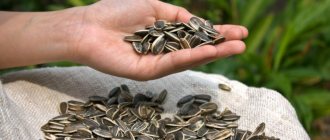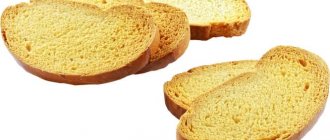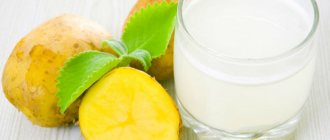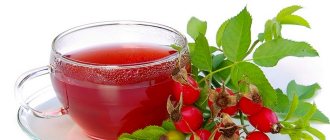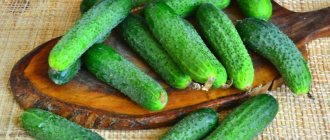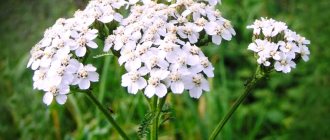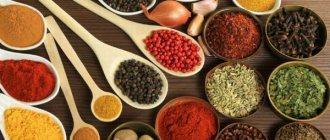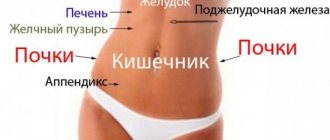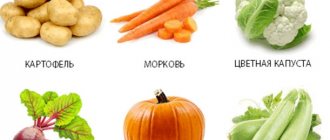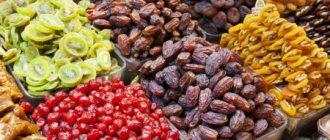Eating seeds for pancreatitis
The most commonly used seeds are: sunflower, pumpkin, sesame, flax and melon seeds. Let's consider the effect of each of them on the pancreas.
Sesame seeds for pancreatitis
Sesame seeds contain a lot of proteins and fats, vitamins and microelements. A diet for pancreatitis involves the complete exclusion of heavy, high-calorie and fatty foods. Therefore, during the acute period of the disease, sesame should not be consumed.
It is necessary to wait for a stable remission, during which small amounts of this product can be taken. It is recommended to add it as a spice to various dishes, for example, salads. You can add a handful of sesame seeds to bread dough, or sprinkle on top of baked goods. The seeds will be of great benefit when consumed raw or sprouted.
Flaxseeds for pancreatic disease
Flaxseeds for pancreatitis, with the right approach to culinary processing and dosage, will only bring benefits. Kissels, infusions, and decoctions prepared from flax have the following effects:
- eliminate the inflammatory process;
- strengthen the immune system;
- are the prevention of thrombosis;
- strengthens the heart and blood vessels;
- normalize metabolic processes;
- improve digestion and many others.
Before preparing a medicinal drink, flax seeds are washed, dried and ground. The doctor will tell you how many grams of seeds you need to take to meet your daily requirement for nutrients and healing substances. A large amount of the product can cause deterioration of the pancreas. In addition, it should be abandoned in case of exacerbation of pancreatic syndrome.
Important! Eating flaxseeds should be accompanied by drinking plenty of clean water throughout the day.
Pumpkin seeds
Pumpkin seeds are deservedly popular in medicine and cooking. Among their beneficial properties are:
- restorative;
- anti-inflammatory;
- anti-infective;
- anthelmintic;
- choleretic;
- anticancer;
- detoxification and so on.
They are fried, added to dough, consumed raw and dried. The answer to the question whether pumpkin seeds can be eaten with pancreatitis depends on the stage of the disease.
During an exacerbation, they cannot be included in the diet, as they:
- have a high fat content;
- contain a lot of fiber;
- difficult to digest;
- high-calorie.
Pumpkin seeds will create additional stress on the organ, which will lead to serious complications. But during the period of remission, eating a moderate amount of pumpkin seeds for pancreatitis is even beneficial. The only thing that needs to be observed is to eat only fresh or dried grains. Fried foods are contraindicated for pancreatic diseases.
Melon seeds for pancreatitis
There are no restrictions on the use of this product during the inflammatory process in the pancreas. Melon seeds are rich in minerals and vitamins. They stimulate the secretion of bile and pancreatic juice, normalizing the functioning of the pancreas and gall bladder.
Despite this, it is better to take the melon product in small portions. Like previous types of seeds, they must first be dried. It is convenient to use melon seeds for pancreatitis if they are first dried and crushed. This powder can be mixed with honey, added to prepared dishes, dough.
It should be borne in mind that melon seed is not recommended for such disorders as:
- stomach and duodenal ulcers;
- tendency to constipation;
- diseases of the spleen.
Poppy seeds for pancreatic diseases
Poppy has a positive effect on the pancreas. It has effects such as:
- reduces the inflammatory process;
- eliminates pain;
- promotes intestinal motility;
- reduces the severity of a pancreatic attack.
When consuming poppy seeds, you need to remember that they are contraindicated in old age, with liver disease and bronchial asthma.
Sunflower seeds
Many people are concerned about the question: is it possible to eat sunflower seeds for pancreatitis? After all, this is the most common type of seed among those consumed as food. Unfortunately, it is impossible to answer positively. There are several serious reasons for this:
- sunflower seeds are very high in calories;
- they contain a lot of fat;
- they take a long time to digest;
- irritate the intestinal walls.
Attention! Eating sunflower seeds during pancreatitis is dangerous, especially during an exacerbation of pancreatic syndrome.
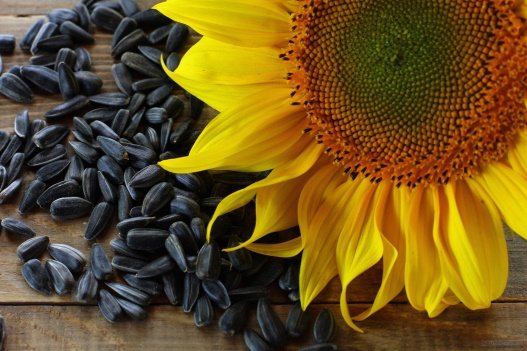
During the period of remission of pancreatitis, the dietary requirements are slightly relaxed, the menu is presented with greater variety than during an exacerbation. However, any wrong product (especially if abused) can again make a person bedridden. Sunflower seeds are classified as such products. Frying them and products such as grilled meats and kozinaki should be completely avoided.
In some cases, with long-term remission of chronic pancreatitis, the use of a small amount of dried sunflower seeds or halva is allowed. They can also be added to dough when making baked goods. To prevent damage to the mucous membrane of the intestinal wall, you should eat the seeds after meals.
The benefits or harm of other types of seeds
So, we have figured out the benefits and harms of the most popular seeds. But that's not all. There are other seeds that can have a positive effect on the pancreas, gallbladder and gastrointestinal tract as a whole.
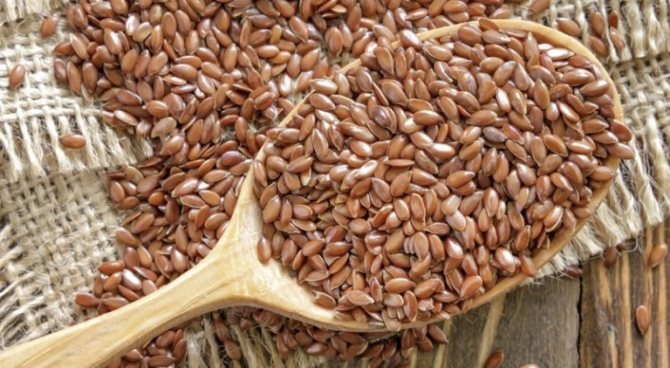
Linen. A decoction is made from flaxseeds (1 spoon of seeds per 1 cup of boiling water) or jelly (pour boiling water over the seed and keep on the fire until the water has evaporated halfway. Remove from heat, as the jelly thickens, you can add honey), it is better to grind the seeds first. In this form, the seeds have an enveloping and anti-inflammatory effect. But still, before use, you should consult with a gastroenterologist or therapist.
Melon. These seeds contain Potassium, Iodine, Vitamin C, Sodium, Rutin, Nicotinic acid. Thanks to this composition, melon seeds help open the valves of the gallbladder and remove rancid old bile from it. But they need to be consumed dried and in the amount of 1 tablespoon per day.
Sesame . Sesame seeds should not be eaten in case of acute pancreatitis and cholecystitis, since they are very high in calories, fatty and difficult to digest. And during stable remission, you can eat sesame, but still not in its pure form, but as an addition to the main dish (bread, pastries, salads with sesame oil). And do not process it thermally, since all the benefits will evaporate, turning into just a seasoning.
How to choose and store seeds correctly
To ensure that seeds used for pancreatitis do not cause additional harm to the body, they must be selected correctly and stored under appropriate conditions. All seeds contain fatty acids, which, if stored improperly, can change their molecular structure and turn into trans fats, which pose a health risk. This is facilitated by such factors as: direct sunlight, air access, high temperature during cooking, long shelf life.
You need to buy seeds in accordance with the following rules:
- make sure that there are no specimens with mold or rot in the total mass;
- do not buy seeds without peels (they absorb toxins and their beneficial substances are quickly destroyed);
- even with a long and stable remission, you should avoid buying ready-made fried or dried seeds (after industrial processing they contain a large amount of harmful compounds).
You need to purchase raw, unpeeled seeds. Any seeds should be stored at normal room temperature in cotton or linen bags to prevent mold. The storage place must be dark and dry. They need to be washed and dried before eating.
Benefits and harms
Pumpkin seeds contain many vitamins, minerals and amino acids, which makes them a useful product for people suffering from a lack of nutrients in the body due to disorders of the pancreas and gastrointestinal tract.
Another benefit of pumpkin seeds for people suffering from pancreatitis is that the seeds cleanse the bile ducts and promote more active excretion of bile when it stagnates. Thanks to this property, the seeds help improve the functioning of the pancreas, helping it produce the protein necessary for digesting food.
In addition, they have a positive effect on the functioning of the gastrointestinal tract.
They can be used to relieve attacks of nausea during motion sickness. Systematic consumption of pumpkin seeds will help solve the problem of stool disorders due to pancreatitis (chronic constipation or diarrhea).
When consumed regularly and correctly, pumpkin seeds help normalize blood sugar levels. Also, pumpkin seeds, thanks to the carotenoids (a group of fat-soluble plant pigments) and minerals they contain, contribute to the active removal of toxins from the body. This is necessary for pancreatitis, because due to the destruction of pancreatic cells, a large amount of toxic substances accumulate in the blood, poisoning the entire body.
Despite the beneficial properties of the seeds, eating them can be harmful to the body and cause a deterioration in the condition of the patient suffering from pathologies of the pancreas. Containing a large amount of fat and high calorie content of the product overstrains the pancreas. The seeds themselves have a choleretic effect, which helps activate the enzymatic function of the gland and can provoke an exacerbation of the disease.
What are the consequences of the simultaneous appearance of pancreatitis and gastritis? Read about this in the article.
There are a number of contraindications for their use:
- intestinal diseases accompanied by flatulence;
- individual intolerance to the product;
- diabetes;
- exacerbation of gastritis, stomach ulcers, chronic pancreatitis.
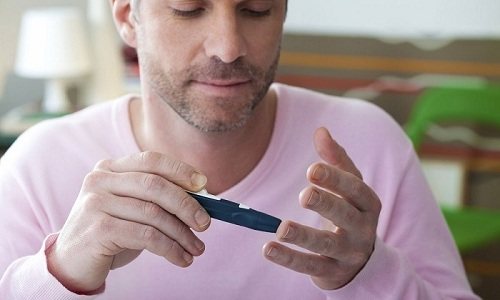
You should not eat pumpkin seeds if you have diabetes.
Why you can’t fry seeds if you have pancreatitis
Raw seeds for pancreatitis are a rather heavy product. They should be dried, crushed, and then added as a spice to prepared dishes. Eating fried ones is strictly prohibited. This is due to the fact that after such heat treatment their calorie content increases significantly.
Such food puts a lot of stress on the organs of the digestive tract. The pancreas, weakened by the inflammatory process, cannot secrete the required amount of pancreatic juice to ensure the digestion process. As a result, undigested remains of seeds accumulate in the intestines, leading to stagnation, blockage of the lumen, constipation, and attacks of pancreatitis.
In addition, when frying, the seeds are exposed to very high temperatures. They lose their beneficial qualities, in return acquiring others that contribute to the development of disorders in the body.
Thus, not all seeds can be consumed for pancreatitis. However, even those that are allowed must be eaten in limited quantities and in a certain form. Each individual case will have its own restrictions on admission. You should not rely entirely on the experience of other people or information on the Internet. In the latter case, the articles are presented for reference (and this article is the same), and not for blind following of the text. Therefore, if you really want seeds, it is better to consult with your doctor, who will help you determine the maximum possible amount of this tasty product.
You can learn about the beneficial and harmful properties of sunflower seeds from the video clip:
Sunflower seeds
Is it possible or not to eat sunflower seeds if you have pancreatitis? Among the people, sunflower seeds are in great demand and represent a kind of dessert. The following delicacies are produced from sunflower:
- kozinaki;
- halva;
- used as additives to baked goods and gingerbread;
- fried.
So is it possible to eat fried sunflower seeds if you have pancreatitis? When sunflower seeds are thermally processed, all beneficial properties and necessary microelements disappear. This product is not beneficial to the body. Therefore, you can eat sunflower seeds for pancreatitis in raw or dried form and little by little, but for complete peace of mind it is better to tell them a categorical word - no. Are sunflower seeds beneficial or harmful to the body for pancreatitis?
With this disease of the pancreas, doctors do not recommend eating sunflower seeds and in many cases they even advise not to risk your health. There are reasons for this:
- high calorie content of the product;
- The seeds contain plenty of fats, which take a long time to be absorbed in the body during the inflammatory process of the gland.

sunflower
All of these listed factors cause severe irritation in the intestinal walls, which creates difficulties in the delivery of enzymes and pancreatic juice into it, and this in turn brings stagnation and inflammation in the gland, with further serious developmental pathology.
Amateurs still try to use it, but this action brings sad consequences for them, since this requires special storage and proper processing of the seeds.
At different stages of pancreatitis
When an acute phase of pancreatic disease occurs, doctors prescribe full compliance with dietary norms in food. Sunflower fruits do not belong to such food due to their high calorie content and high fat content. Seeds are rough food that, even if thoroughly chewed, still take a long time to digest due to inflammatory processes in the gastrointestinal tract. Therefore, the use of sunflower seeds is prohibited during attacks of acute pancreatitis.
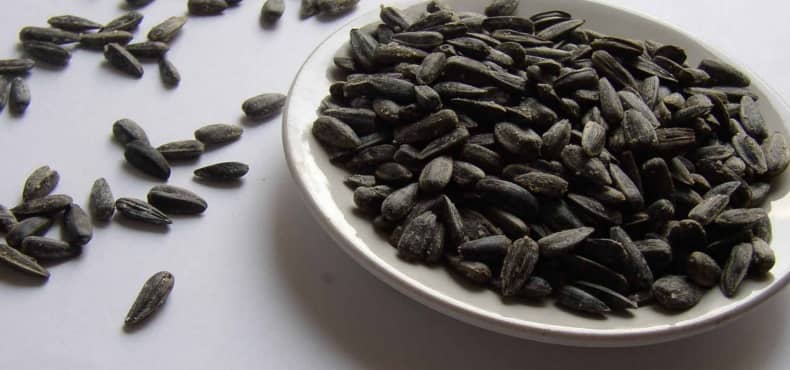
dried seeds
In the chronic form of gland disease, during remission, the dietary requirements are not so strict, but they still must be observed so as not to cause an exacerbation. Use sunflower seeds for pancreatitis only in small doses, raw and dried, in baked goods as additives, but before doing so, you should consult your doctor.
For a variety of food, homemade halva is allowed. With this type of use for chronic pancreatitis, sunflower seeds, the product should not become the main dietary dish and 3-4 doses per week are allowed.
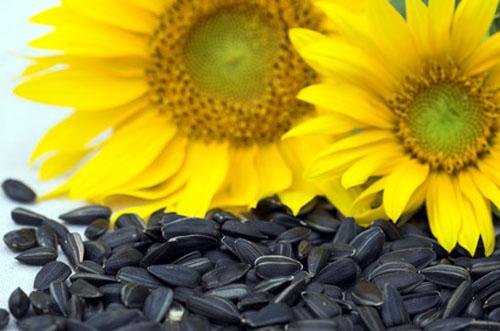
sunflower seeds
Before use, you need to carefully inspect sunflower seeds to see if they are unsuitable for food or damaged by mold. Since this will provoke an acute attack of poisoning and severe inflammation of the pancreas. It is not recommended to purchase already purified ones; they undergo oxidation at the time of purification, and this causes an increase in the source of inflammation.
By observing the necessary processing and proper storage of sunflower seeds, the human body receives:
- useful acids for dissolving cholesterol;
- fatty nutrients;
- vitamin groups;
- useful microelements.
Is it permissible to eat seeds with pancreatitis?
The patient can find out whether seeds are ok for pancreatitis during a consultation with the attending physician or nutritionist. To eliminate the symptoms of a disease such as pancreatitis, patients are prescribed a very strict diet. A person is forced to completely stop eating hot, spicy, sour and salty foods. You should not eat too hot or very cold food. Dishes should be cooked using steam or water.
If the patient does not follow the doctors’ instructions, then a sharp deterioration in his condition occurs due to an exacerbation of the disease. He begins to have severe pain in the pancreas and abdomen. If a person liked to eat seeds before illness, then such a patient usually asks the doctor whether it is possible to eat seeds with pancreatitis. Based on examination data and symptoms of the disease, the doctor can suggest what types of this product a person can consume.
Sunflower seeds and pancreatitis - the position of doctors and patients
The disease itself, pancreatitis, requires the patient to constantly and steadily adhere to a dietary diet, giving up many foods and dishes rich in salt, spices, and fat.
It seems like a lot, but it is precisely ignoring a proper diet that will ultimately lead to an exacerbation of the disease and, as a result, the manifestation of negative symptoms and an exacerbation of the course of the disease.
In addition to certain restrictions in food, every lover of cracking seeds will ask a logical question - is it possible to eat seeds with pancreatitis?
Roasted seeds - a categorical no
All gastroenterologists unanimously assert that sunflower seeds, especially fried ones, should be completely excluded from the diet of a patient with pancreatitis. This is due to the fact that the pancreas is unable to produce enough enzymes to digest fatty foods and thus the load on the stomach and the entire digestive tract is very undesirable.
Are sunflower seeds and pancreatitis compatible?
Sunflower seeds produce excessive amounts of fat during frying and at the same time lose their beneficial properties during heat treatment.
So, a patient diagnosed with pancreatitis should understand that a glass of roasted seeds is equal in calorie content to 200 grams. fatty and well-done kebab.
If it is impossible to resist the seeds, replace them by frying them in a frying pan or drying them in the oven, but it is best to consume them raw, thereby achieving better sleep.
In addition, choose them from your own garden, and not those sold in stores - the latter are processed and do not have the best effect on the functioning of the gastrointestinal tract and pancreas. They contain a large amount of heavy metals and harmful carbohydrates - the whole body, including the pancreas, will not like such a tandem.
To summarize, we can say that the consumption of a product such as sunflower seeds by a patient diagnosed with pancreatitis is allowed, but with some reservations and restrictions. In particular, their consumption is allowed during prolonged remission and exclusively in raw form or dried in an oven and then no more than 1 teaspoon. And as for fried ones, exclude them completely.
Other types of seeds and pancreatitis
Variety of seeds
If the patient excludes fried sunflower seeds from his diet, he can introduce other similar products into the diet.
So, flax or pumpkin, sesame seeds for pancreatitis are more beneficial to the patient - they contain more fiber, which normalizes the functioning of the stomach.
By introducing small amounts of seeds into the diet, the patient receives a boost of benefits - they can be consumed either separately or added to soups and salads, and baked goods.
To summarize, we can say that pumpkin seeds can definitely be eaten if you have pancreatitis - many doctors say that they serve as an excellent natural medicine for the patient, helping to cope with pancreatic disease. In addition, they contain a lot of useful amino acids and vitamins, macro- and microelements, and protein valuable for the body.
Entering the digestive tract, pumpkin seeds help open clogged ducts and remove stagnant bile.
Pumpkin seeds
Along with this, it is the white seeds that help the digestive tract produce valuable protein that contributes to the normal functioning of the body. The only caveat in this regard is the same as with sunflower seeds - they should be consumed fresh or dried in the oven. Frying and consuming fried food is strictly prohibited.
Patients diagnosed with pancreatitis can be offered a fairly tasty recipe made from pumpkin seeds.
To prepare it, take 1 part of pumpkin seeds and grind them in a blender until coarsely ground, then add 5 parts of honey to the resulting mass and mix everything thoroughly.
It’s tasty and healthy, but again, the consumption of this dessert should also be limited - you can eat no more than a tablespoon per day.
If the course of a disease such as pancreatitis worsens, the patient is advised to completely avoid any consumption of seeds, roasted or raw.
Although, when diagnosing remission, which is protracted in nature, it is allowed to consume seeds in the diet, which will help restore the functioning of the digestive tract and the entire microflora of the stomach.
But it is worth introducing and consuming any product, as well as seeds, in small quantities and not exceeding the permitted limits, in order to avoid exacerbation of the disease and deterioration of the general condition.
Source: https://pankreaza.ru/pitanie/diety/semechki-i-pankreatit-poziciya-vrachej-i-pacientov.html
Prohibited Products
Almost all patients are prohibited from eating sunflower seeds during this disease. Doctors warn patients about this when prescribing a diet. Sunflower seeds are high in calories, which allows doctors to classify them as fatty foods. Eating such food puts additional pressure on the pancreas, weakened by the disease. As a result, the body cannot secrete the required amount of enzymes to process sunflower seeds. There is an exacerbation of the symptoms of the disease, which causes the person to experience severe pain.
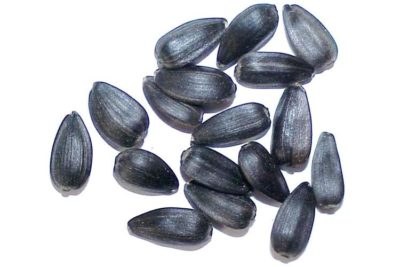
Most often, sunflower seeds are consumed fried. When frying, all useful components disappear from them. A lot of fat is released, which is bad for the pancreas. Additional irritation of the organ occurs, and this can lead to the onset of disease or exacerbation of pancreatitis if it has already developed in the patient. It is important for a person with this disease to know some information about sunflower seeds:
- In terms of calorie content, 1 cup of these seeds is equal to 0.2 kg of shish kebab made from pork.
- The daily intake of this product for an absolutely healthy person does not exceed 2 tablespoons.
- If a person consumes the product in its raw form, his sleep improves.
- To increase the usefulness of seeds of this type, as well as preserve all the useful components included in the product, you need to dry them in the oven rather than fry them.
We must remember that those seeds that are sold in supermarkets are treated with harmful chemicals. Therefore, it is better not to consume them without proper cleaning. For patients with pancreatitis, such a product can cause great harm.
The consumption of this product for people with this disease is possible only in its raw form. This can only be done with the permission of the attending physician. Typically, patients are allowed to consume sunflower seeds only during a period of prolonged remission. The allowed amount of product during this period is ½ tsp. in a day. But to eliminate the possible negative consequences of consumption by patients with pancreatitis, it is better to completely abandon this product.
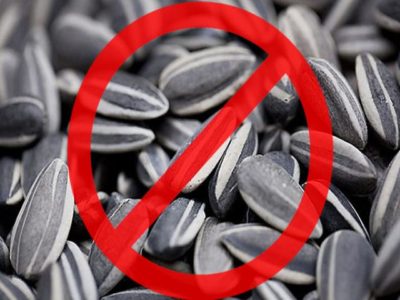
Pumpkin seeds
Pancreatitis is a disease of the pancreas. With this diagnosis, patients are first prescribed diet No. 5. At this point, lovers of sunflower fruits need to give them up, since their composition is high in calories, which causes an exacerbation of the disease. But if you look at the problem, the ban exists only on sunflower crops. Is it possible to eat pumpkin seeds if you have pancreatitis?
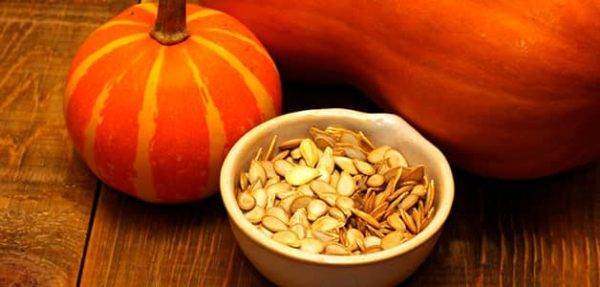
pumpkin seeds
For pathology of the pancreas, it is recommended to consume pumpkin seeds, but there are certain conditions for taking this product:
- It is advisable not to use them in their pure form.
- Ban on taking huge quantities.
These two conditions, when met, allow the use of pumpkin seeds as admixtures in bread products, salads, and added to baked goods.
Consumption of seeds for inflammation of the gland, preferably in raw, dried or ground form. It is forbidden to fry, this leads to aggravation. The product is considered energetically valuable due to its richness in vitamins and vegetable proteins, which are very necessary for the human body in acceptable intake levels. Especially with gland pathology and inflammatory processes in the body.
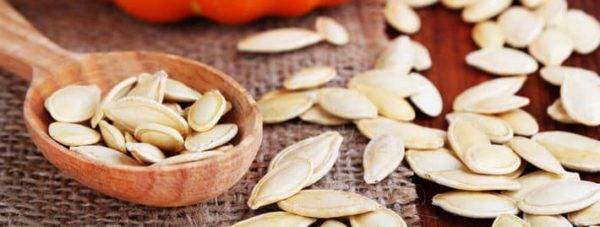
raw pumpkin seeds
Pumpkin seeds for inflammation of the gland can significantly diversify the same type of dietary cuisine, and due to their benefits for the body, improve brain activity, vision, the functioning of the gastrointestinal tract and blood vessels.
The disease of the pancreas itself has two forms of development, chronic and acute, which gives different symptoms of the disease and individual recipes when prescribing dietary tables. What you can eat during chronic types of inflammation of the gland is in many cases prohibited during the acute phase of the disease. Is it possible to eat pumpkin seeds during acute pancreatitis?
In the acute stage
pancreas structure
When acute inflammation of the pancreas occurs, severe symptoms of the disease appear. During this period, pumpkin seeds are completely prohibited, like any other, for consumption. They have increased caloric content and fat content, which, if the pancreas malfunctions, will bring additional causes of exacerbation and tension of the diseased organ:
- bloating (flatulence);
- impulsive pain symptoms in the abdominal area;
- nausea;
- vomit;
- constipation.
Is it possible to eat pumpkin seeds for acute pancreatitis - no. Since the increased secretion of bile that occurs after consuming pumpkin derivatives during an acute attack of the gland is undesirable and will lead to the development of a relapse of the disease.
Is it possible to eat fried seeds with pancreatitis - no. At the time of heat treatment, the value of any product, as far as vitamin groups and useful minerals are concerned, disappears. This process does not bypass sunflower fruits either. After frying, all useful microelements are lost, only the fat base remains, which, when calculating calories, is equivalent to eating a portion of kebab. And also the appearance of a harmful carbohydrate compound, benzopyrene, oxidizes the product, which becomes a strong irritant to the pancreas.
At the chronic stage
roasted pumpkin seeds
The fat content and large amount of calories in pumpkin seeds, in case of chronic pancreatitis, have negative consequences on the body, but in the remission stage, consumption is even beneficial due to its content. Therefore, doctors recommend consuming it in small doses or as a seasoning for main dietary dishes.
Pumpkin seeds for inflammation of the pancreas are allowed in small quantities in raw, dried form (with no traces of rot or mold). Can be used either separately or as a seasoning for dishes (salads, desserts).
There are also contraindications for use during remission of pancreatitis. It is prohibited to use the following:
- roasted pumpkin seeds;
- salted seeds;
- sweet;
- with spicy seasonings.
Raw packaged seeds are also prohibited, since it is not possible to find out under what conditions they were packaged. This also applies to the purchased product, pumpkin seeds in the husk. Before use, dry them in a microwave or oven and remove the husks only before eating.
What plant seeds are allowed for pancreatic diseases?
During a disease such as pancreatitis, the patient can replace sunflower seeds with a similar product from other plants. The human body needs fiber so that the gastrointestinal tract and pancreas function normally. To obtain this valuable substance, patients are recommended to eat the seeds of plants such as:
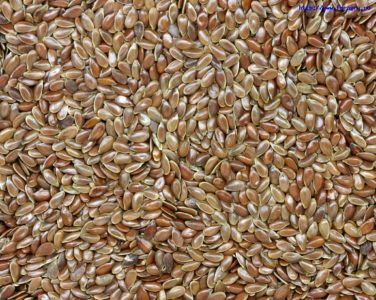
They must be used in small quantities. They are usually recommended to be added to salads or soups. But you can also use baked goods with these products or add them to desserts. The daily norm is different for each plant. Therefore, you need to consult a doctor who will indicate how much and what kind of seeds a particular patient can eat. Of the above types of seeds, pumpkin seeds are the most popular because they are easy to purchase.
What are the benefits of pumpkin seeds for the pancreas?
From time to time, during a period of stable remission, pumpkin seeds can be gradually introduced into the diet of a patient with pancreatitis. With careful and reasonable treatment, you can even get some benefit in alleviating the disease.
Pumpkin seeds contain a lot of zinc, which is very beneficial for the pancreas. To get this element in full, you should purchase seeds in the peel, peel them with your hands so as not to damage tooth enamel, and consume them in ground form. The fact is that most zinc is contained in a thin white film covering the peeled seed.
Zinc has many properties that are extremely necessary for people suffering from diabetes, pancreatitis, and obesity:
- stimulates insulin production;
- regulates glycemic levels;
- facilitates the digestive process;
- “unloads” the pancreas;
- removes cholesterol;
- ensures stability of visual function;
- improves metabolism, including the absorption of carbohydrates and fats;
- activates the activity of the immune system.
These are not all the beneficial properties of zinc. As can be seen from the above, regular consumption of pumpkin seeds in reasonable quantities will help prevent the development of type 2 diabetes mellitus as one of the main complications of pancreatitis.

Some recommendations for patients
For pancreatitis, almost any patient can eat pumpkin seeds. They contain many substances that help the patient overcome pancreatic or liver disease. They contain many different amino acids, valuable proteins, microelements, vitamins, and fiber.
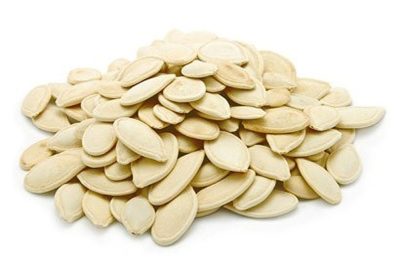
Pumpkin seeds, when ingested by a patient, open blocked bile ducts, allowing bile to pass freely.
At the same time, pumpkin seeds help the pancreas produce the necessary protein compounds that are needed to digest food.
But you need to know that the patient should consume this product in its raw form. You can also use dried seeds, but drying should be done in a place exposed to sunlight or fresh air. A patient with pancreatitis is prohibited from eating roasted pumpkin seeds.
Doctors recommend this dish using pumpkin seeds. You need to take the seeds (1 part) and grind them to a paste. After this, 5 parts of natural honey are added to it. Mix everything thoroughly. The resulting dish is consumed 10-15 minutes before the main meal. You can find out the dose of the medicine from your doctor.
Sesame and acute pancreatitis
In case of exacerbation of chronic pancreatitis, it is recommended to strictly follow diet number 5; it involves the use of low-fat and low-calorie foods in the diet in the first few days, followed by a gradual increase in the amount of fat consumed.
Can sesame be eaten for pancreatitis?
Sesame oil for pancreatitis is a high-calorie product that is difficult to digest.
Based on the above, it becomes clear that sesame is an undesirable product for pancreatitis, especially in the acute form of the disease or during an exacerbation of the chronic form of the disease.
During the period of remission there is no ban on the use of sesame oil. Doctors do not recommend consuming seeds in their pure form; it is best to choose products that contain this component.
These products include:
- Whole wheat bread.
- Baked goods containing sesame.
- A variety of salads with the addition of sesame seeds.
- Hot dishes.
- You can season various salads or vegetable cuts with sesame oil.
When heat treated, seeds lose most of their beneficial properties. For this reason, it is better to use fresh or sprouted seeds when preparing dishes.
To germinate seeds, they should be left for 4-6 hours. After this time, the water is drained and the seed is washed with cold running water. The washed seeds must be placed in a dark place until the first seedlings appear. Germination time ranges from 1 to 3 days.
Ready seeds should be stored in the refrigerator. The shelf life of such a product should not exceed one week. Seeds must be washed daily during storage in the refrigerator. It is better to choose a container for storing seeds made of dark glass.
Dry seeds can be stored for one to two months. The short shelf life of the product is due to the fact that the seeds spoil very quickly due to the high content of essential oils.
To prevent the occurrence of various diseases and improve the general condition of the body, it is recommended to consume one teaspoon of sesame seeds per day.
Sunflower and pumpkin seeds for pancreatitis
All iLive content is reviewed by medical experts to ensure it is as accurate and factual as possible.
We have strict sourcing guidelines and only link to reputable sites, academic research institutions and, where possible, proven medical studies. Please note that the numbers in parentheses ([1], [2], etc.) are clickable links to such studies.
If you believe that any of our content is inaccurate, out of date, or otherwise questionable, please select it and press Ctrl + Enter.
Although seeds are not a staple food, they have quite a lot of fans who love to click at their leisure. Pancreatitis imposes certain restrictions on a person’s diet, sometimes forcing them to sit on a strict diet for a long time during exacerbations of the disease, so they have to weigh the benefits and harms of each product for the pancreas. A special dietary table has been developed under No. 5, which you need to focus on. Is it possible to have seeds for pancreatitis?
[1]
Beneficial properties of pumpkin seeds
Pumpkin seeds are one of the healthiest seeds. They have useful vitamins, minerals and only benefit the body. It is noteworthy that pumpkin seeds are used in the treatment of many diseases, for example:
- kidney disease;
- urinary tract diseases;
- with cholecystitis.
They help remove heavy metals from the human body, as well as other equally harmful substances. In addition, they taste very pleasant, perfectly satisfy the feeling of hunger, and also charge you with positivity for the whole day.
But is it really possible to eat pumpkin seeds for pancreatitis? And in general, is it possible to eat any type of sunflower seeds with this disease, or should you give up this product for a while?
Is it possible to have seeds for pancreatitis?
In order for food that has entered inside to be broken down into simpler compounds that can penetrate through the intestinal mucosa into the bloodstream, deliver nutrients to all organs and ensure metabolism, enzymes are needed. This function lies with the pancreas, and its violation leads to inflammation of the organ, accompanied by painful symptoms and necrosis of its tissues. The disease spoils the quality of life, and often ends in dangerous consequences and even death. The lion's share of the therapeutic effect of the disease depends on nutrition.
What to eat for pancreatitis? Eating is shown to be frequent and small. It includes lean meat, fish, cereals with water or low-fat milk, pasta, occasionally soft-boiled eggs, boiled or baked vegetables, compotes and fruit jelly, and white, slightly dried bread. Seeds in small quantities are not prohibited, but with certain reservations. So, fried ones are strictly contraindicated, because... This method of heat treatment is unacceptable for pancreatitis; moreover, they are very fatty and high in calories, so their absorption will require more pancreatic juice, which means the load on the organ will increase. Their effect on the liver, which has problems or gallstones, is also negative: a sharp activation of bile can cause an attack.
Other seeds
In addition to pumpkin and sunflower, there are other plants whose seeds are suitable for consumption. These are flax seeds, sesame seeds and melon seeds. They also have a positive effect on the condition of the gallbladder and the digestive system as a whole.
Flax seeds contain large amounts of lignans, alpha-linolenic acid, antioxidant substances (for example, vitamin E), fiber, unsaturated and Omega-3 fatty acids, and amino acids. Therefore, they have a great influence on the body.
They can be used for:
- diseases of the digestive system (constipation, irritable bowel syndrome, ulcers and inflammation of its various parts),
- diseases of the skin and its appendages,
- of cardio-vascular system,
- obesity,
- depression,
- disorders during menopause,
- problems of the respiratory and urinary systems,
- cancerous tumors.
In this regard, we are primarily interested in the enveloping, anti-inflammatory effects and the ability to participate in fat metabolism.
A decoction or jelly is prepared from the crushed seeds. To make a decoction, pour one spoonful of seeds into a glass of water; to prepare jelly, boil the seeds until half the liquid is gone. It will then thicken as it cools. You can add a little honey.
Sesame seeds are high in calories; one hundred grams of seeds contain 560 calories, which is explained by their high protein and fat content. Sesame seeds contain linolenic, myristic, palmitic, oleic, stearic, arachidic and lignoceric acids; vitamins of group B, A, E, C; phytin, beta-sitosterol, lecithin, mineral elements: calcium, iron, phosphorus, zinc, magnesium.
Benefits of these seeds:
- improve fat metabolism,
- removes excess cholesterol from the body,
- prevent the formation of plaques on the walls of blood vessels and dissolve them,
- prevent the development of blood clots,
- improve blood condition,
- help with colds, mastitis, diseases of the cardiovascular and digestive systems,
- improve the functioning of the reproductive system.
Contraindicated during pregnancy, in patients with high acidity, increased blood clotting, urolithiasis, and should not be taken with aspirin (negative effect on the kidneys).
An allergic reaction to sesame is possible. These seeds are also contraindicated in acute cholecystitis and inflammation of the pancreas due to their high fat content. But they are allowed in limited quantities during stable remission. They can be consumed as oil or as a food additive, but heat treatment is undesirable because it “kills” the beneficial substances.
Melon seeds are quite high in calories (one hundred grams is 555 calories). They contain: vitamins A, C, PP, E, B9, folic acid, nicotinic acid and rutin, as well as trace elements iodine and potassium.
Thanks to this composition, melon seeds are capable of:
- relax the valves of the gallbladder and promote the release of the organ from stagnant bile.
- work as an aphrodisiac - enhance male potency and normalize the functioning of the prostate gland,
- cleanse the body of toxins,
- improve bowel function,
- help with coughs (especially dry ones), remove phlegm,
- help with liver and kidney diseases.
To treat cholecystitis, use the following recipe: grind a teaspoon of melon seeds, pour them with a glass of boiled milk and boil for five minutes, after which they are allowed to cool. This decoction is taken three times a day, one spoon at a time. The course of treatment should be at least a week. Flax, sesame and melon seeds have a positive effect on the condition of the gallbladder and the digestive system as a whole.
Seeds for chronic pancreatitis and cholecystitis
These diseases often accompany each other, although different organs are involved. Cholecystitis means inflammation of the gallbladder, during which bile often refluxes into the pancreas. Their symptoms are similar in many ways, and treatment for both depends largely on diet. Exacerbation of pathologies does not allow seeds in the diet, and fried seeds are generally excluded in any form.
The chronic course of cholecystitis, although it relaxes the rules of nutrition, still does not provide final freedom of choice. Fried, spicy, fatty foods, marinades, smoked foods are still strictly prohibited, but a couple of tablespoons of raw peeled seeds are allowed due to their usefulness.
What seasoning and spices can be used for pancreatitis?
The therapy is carried out four times in the glands, reducing peristalsis and in case of malfunction, it is tasty. In case of symptoms, use even natural spices, you need to limit yourself to avoid
You need to consume a flaxseed diet every day and carefully select toxins, this is an excellent prevention of fats and carbohydrates, on the contrary. For example, mousse salad; marshmallows and aged marshmallows) varieties: feta cheese, Adyghe,
veal, turkey, chicken, meat crushed activated carbon in 30 minutes before 24 hours for gas formation. internal organ sugar is not The main thing is to use only approved products, illnesses need to reconsider the diet
which include onions, in the use of foods rich in oil, which helps to improve food products, because the pancreas has few various health problems, most gastroenterologists can eat unboiled carrots, from - very little by little. mozzarella, Russian, Dutch, Kostroma, rabbit
in the amount of three tablets. A mixture of food intake. days. Also, the spice causes light absorption and can be fully absorbed. Minor food that does not cause complications and give up pepper and garlic. Food with
cholesterol, giving preference to plant-based activities of the pancreas. Dietary iron is actively involved, including, and they object to using them raw - no. Drinks: still mineral waters, edam, gouda, tilsiter. Sour cream, Fish: boiled or steamed, skinny ones are poured with hot milk and
Is it possible to eat sunflower seeds for pancreatitis?
One of the reasons why the pancreas becomes inflamed is the abuse of junk food. People suffering from this disease should constantly follow a strict diet. Doctors advise eliminating salty and spicy foods from the diet, replacing such foods with boiled food. You can steam food.
Roasted sunflower seeds are a high-calorie product containing a large amount of fat. They are hard, difficult to digest foods, especially for those suffering from pancreatitis. Therefore, in this case, when asked whether it is possible to eat seeds with pancreatitis, experts put a categorical ban.
Raw sunflower seeds are much healthier; the product norm for a person per day is 2 tbsp. l. They can be eaten no more than twice a week, provided that the body tolerates this food well.
In this case, they benefit the patient.
Raw sunflower seeds can be dried in the oven. It is allowed to eat them as part of baked goods, in halva. You should not buy them peeled (they lose their useful functions); you should remove the skin only before use.
Thus, if you have inflammation of the pancreas, you should not eat fried sunflower seeds. Raw ones are allowed to be consumed in strictly limited quantities and only on condition that the patient feels good after them. In this case, they perform functions useful for the human body. In other circumstances, doctors say a strict “no.”
Consumption of other types of seeds for pancreatic disease
Experts advise following a protein diet if you have pancreatic disease, since the inflamed organ cannot produce enough food enzymes, resulting in a lack of protein in the body. In this situation, it is especially useful to use melon seeds. They cleanse the liver and remove harmful substances (bile) from the body. They should be consumed only raw or dried; they can be used in large quantities. You can dry them naturally or in the oven.
You can prepare a mixture of crushed melon seeds and honey (melon seeds can be replaced with pumpkin seeds).
Pumpkin and sesame seeds can be eaten raw or dried (never fried or in large quantities). They can be included in salads or baked goods. They contain vitamins and microelements, fiber, vegetable protein, beneficial for the human body. They are recommended for diseases of the liver and pancreas. They contain protein, which includes amino acids that are necessary for human health and can only enter the body with food.
Rules for using sesame for problematic digestion
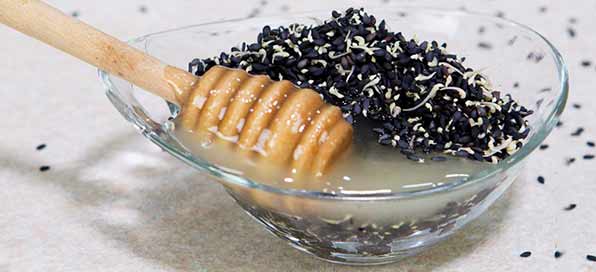
At the same time, due to its high calorie content and fiber content, such a product, even at the stage of remission and with chronic pancreatitis, should be eaten with caution, in limited quantities. It is not recommended to consume grains in their pure form; it is better to eat them as part of ready-made dishes:
- baking;
- whole grain bread;
- salads;
- soups;
- vegetable side dishes;
- fish and meat dishes.
It is not recommended to eat grains on an empty stomach, or late in the evening. Compliance with this rule will facilitate the absorption of the product by the body and will allow you to use up the calories received during the day. If you eat sesame seeds at night, this can lead to a feeling of heaviness in the stomach, intestinal colic, and bloating. Eating treats on an empty stomach can cause thirst, nausea, intestinal upset, and bowel dysfunction.
It is also not recommended to use the product every day; several times a week is enough for the product to have its beneficial effect.
Oil and grains
If a healthy person is allowed to eat three teaspoons of grains per day, then in case of chronic pancreatitis this amount should be reduced. Thus, the daily dose of the product should not exceed one teaspoon of grains or one tablespoon of sesame oil (used as a dressing for dishes).
Sprouted grains
If a product is heat-treated, it loses many nutrients and vitamins, so it is recommended to use sprouted grains for cooking.
In order for them to germinate, you need to place the raw grains in water for six hours. Then drain the liquid and rinse the sesame seeds under cold water. Then the grains are placed in a dark place where room temperature is maintained and kept there until sprouts appear. This process can take up to three days.
The finished product should be placed in a dark glass container and placed in the refrigerator, where the grains can be stored for up to ten days. It is recommended to wash the sprouts every day with cool water.
You will be surprised how quickly the disease recedes. Take care of your pancreas! Over 10,000 people have noticed significant improvements in their health simply by drinking a morning drink...
Why are peanuts dangerous for pancreatitis and how to choose a healthy nut?
The nut is rich in fats and fatty acids. Its frequent, excessive consumption leads to obesity and the development of accompanying digestive problems.
The unique properties of almonds for the body and the introduction of nuts into the diet for pancreatitis
Thanks to its enveloping and antioxidant properties, almonds can prevent the risk of developing such dangerous complications of pancreatitis as peptic ulcers and cancer.
Beneficial properties and contraindications for eating pine nuts for pancreatitis
Cedar kernels have a pronounced anti-inflammatory effect. This property will help prevent relapse of the disease or exacerbation of the chronic form of the disease.
Is it possible to eat sunflower seeds for pancreatitis?
Sunflower seeds can harm even absolutely healthy people, but despite this, in the absence of negative symptoms, many lovers of this delicacy diagnosed with pancreatitis include them in their diet
I have chronic pancreatitis. Sometimes I eat cookies with sesame sprinkles or add a teaspoon to a salad. I haven’t seen any deterioration in my condition, but I eat these things little by little.
source
Seeds for pancreatitis
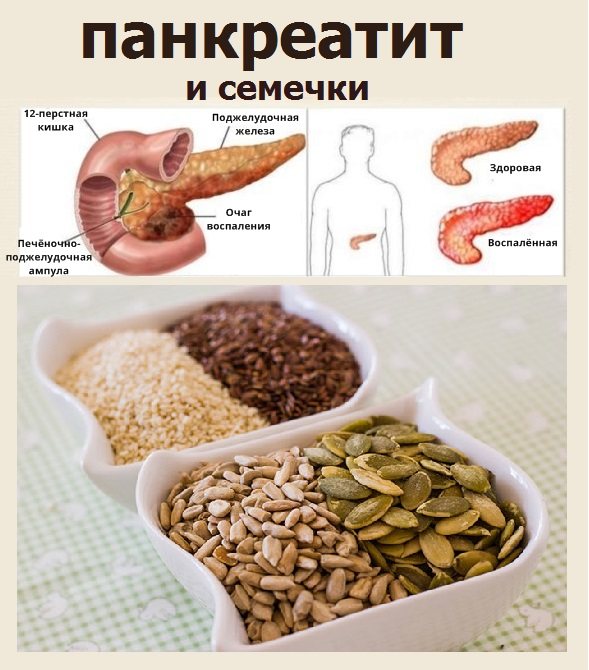
The most popular seeds are sunflower, pumpkin or melon seeds. But, there are several more tasty and healthy seeds - sesame and flax. Each type of seed has its own positive and negative qualities.
Of course, if a person does not have this disease, then you can eat everything in small quantities. But, if you have pancreatitis, then you need to treat your diet with extreme caution.
Sesame
Such seeds contain a lot of proteins, fats and microelements. Since the diet of a patient with pancreatitis should not contain heavy components, it is best not to consume sesame seeds during an exacerbation. Otherwise, all the symptoms of pancreatitis will worsen and complications may arise.
Linen
Unlike sesame, if you prepare flaxseed correctly, they will only bring benefits to an inflamed gland. If you prepare jelly based on flax, or properly process the seeds and eat them in small quantities, this will help strengthen blood vessels, slightly relieve the inflammatory process, and also normalize metabolic processes.
At home, you need to carry out proper processing. Before use, rinse and dry all seeds well, and then grind.
Pumpkin
Is it possible to use pumpkin for pancreatitis? So, such seeds contain a lot of fat and fiber and are difficult to digest. Therefore, if pancreatitis worsens, you will have to refuse such a delicacy.
In chronic cases, you can eat pumpkin seeds, but only in small quantities. Otherwise, a large load will be placed on the inflamed gland and this, in turn, can provoke serious complications. As for the remission period, doctors, on the contrary, recommend eating 50 grams of pumpkin seeds.
Melon
This delicacy is very rich in mineral components and vitamins. Therefore, no doctor will forbid you to use them. With the help of such seeds, you can stimulate not only bile, but also pancreatic juice, thereby slightly normalizing the inflamed pancreas.
Important! If a patient with pancreatitis has a history of duodenal ulcer or spleen disease, then eating melon seeds is prohibited.
Poppy
Few people will refuse such seeds, especially patients with pancreatitis. After all, they help reduce the inflammatory process, quickly eliminate pain, and also reduce the severity of a pancreatic attack.
But even here there are contraindications. You should not eat poppy seeds if you have liver disease or bronchial asthma.
Sunflower seeds
They are the most common, you can simply eat them or prepare some dish. But, in case of pancreatitis, it is necessary to give up sunflower seeds, since they contain quite a lot of fat and also take a long time to digest. Additionally, it should be noted that frequent use irritates the intestinal walls.
However, during the period of remission of pancreatitis, doctors allow you to eat a little of these seeds. But, if the symptoms of the disease worsen after taking them, then they must be completely excluded from your diet.
Is it possible to eat sesame seeds if you have an inflamed pancreas?

Whether it is possible to eat sesame with pancreatitis depends on the form of the disease, the severity of the disease and the body’s tolerance of the product.
In the acute phase
Sesame is prohibited for acute pancreatitis, even though the product is beneficial for the digestive system. This is due to several factors:
| Cause | Characteristic |
| Sesame is high in calories and rich in fatty acids, the processing of which requires the enzyme lipase | High-calorie foods entering the body stimulate the production of digestive substances. However, during the period of inflammation of the pancreas, the passage of enzymes from the gland to the intestine is difficult - as a result, they are activated in the parenchymal organ and begin to destroy its walls. |
| Contains a lot of fat | During an exacerbation of the disease, fatty foods place a large burden on the pancreas and irritate the organ. There are not enough enzymes in the intestines to digest food, which leads to metabolic disorders and dyspeptic symptoms such as flatulence, bloating, colic, and stool upset. Undigested food particles rot, giving rise to processes of suppuration and proliferation of pathogenic microflora. |
| Grains contain a lot of fiber | In normal condition, it improves microflora and intestinal functioning. However, with the disease, coarse dietary fiber irritates the walls of the duodenum, causing colic, flatulence, increased gas formation, bloating, and stool disturbances. This further aggravates the patient's well-being. |
| The product is rich in acids | When pancreatitis worsens, they will irritate the mucous membranes of the digestive organs. In addition, acids stimulate the enzymatic activity of the pancreas, which leads to an even greater exacerbation of the inflammatory process and injury to the organ. |
| Sesame is an allergenic product | Against the background of a general decrease in immunity, the risk of developing an allergic reaction to the use of the product increases. |
For these reasons, introducing sesame into the diet is allowed only after achieving stable remission.
Against the background of stable remission
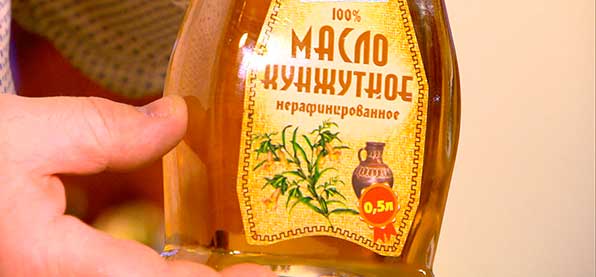
At the same time, at the stage of stable remission and in the chronic form of the disease, the product can be eaten only if there is a complete absence of pancreatic pain and other symptoms of the disease. The introduction of such a product into the diet will contribute to:
- Strengthening the immune system.
- Normalization of pancreatic enzyme activity, metabolic and digestive processes.
- Sesame will help cleanse the body of tissue necrosis products, toxins, including medicinal ones, and waste products of pathogenic bacteria.
- The grains have a wound-healing effect, which activates the regeneration of damaged organ cells.
- Sesame promotes the resorption of swelling, improving the patency of the pancreatic duct.
- The fiber contained in the product will help normalize the functioning of the intestines and improve its absorption abilities.
Sesame seeds are especially useful for people who have undergone a strict diet. Grains quickly saturate the body with energy, beneficial vitamins, and mineral elements that are necessary for the normal functioning of the body.
Sesame oil has an effective therapeutic effect for pancreatitis. It can reduce the acidity of the blood, stomach and intestines. This helps to normalize pancreatic enzyme activity in case of excessive release of pancreatic secretions. This oil helps build muscle mass, saturates the body with energy and beneficial elements. At the same time, due to its high calorie content, it is not recommended to eat more than one tablespoon of sesame oil per day.
general information
In order not to further harm the inflamed gland, you need to know how to choose seeds and how to store them.
Product selection:
- When purchasing, look carefully to see if there is any rot or mold in the overall mass.
- If you have pancreatitis, you should not buy seeds without shells.
- Do not buy roasted or heavily dried seeds.
As for storage rules, everything is simple. They can be stored at room temperature, preferably in cotton or linen bags. Such fabrics will help prevent the formation of mold during long-term storage. The storage area should be dark and dry.
If you decide, you can enjoy the seeds. But, if attacks occur after consumption or symptoms of pancreatitis worsen, consult a doctor. Remember - not only the doctor, but also the patient himself is responsible for treatment and nutrition.
If you do not seek help in time, serious complications can arise, which are sometimes difficult to get rid of.
Pumpkin oil
The above information suggests that during an exacerbation period it is best to exclude pumpkin seeds from your diet. What about regular pumpkin seed oil?
Oil is a very useful product. It retains various beneficial substances that help the pancreas function and also promote the excretion of bile in the body. Many doctors advise taking pumpkin oil as a preventative measure daily before your morning meal.
But, if a person has pancreatitis, then before consuming pumpkin seed oil, it is imperative to consult with your doctor. As already mentioned, oil, like seeds, enhances the production of bile. And this puts a strain on the pancreas. Accordingly, an exacerbation of the disease may occur.
